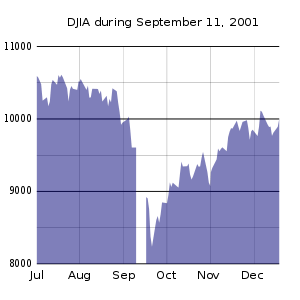Shock (economics)
In economics, a shock is an unexpected or unpredictable event that affects an economy, either positively or negatively. Technically, it is an unpredictable change in exogenous factors — that is, factors unexplained by economics — which may influence endogenous economic variables.
The response of economic variables, such as output and employment, at the time of the shock and at subsequent times, is measured by an impulse response function.[1]
Types of shocks
If the shock is due to constrained supply, it is called a supply shock and usually results in price increases for a particular product. A technology shock is the kind resulting from a technological development that affects productivity. Supply shocks can also be produced when accidents or disasters occur. The 2008 Western Australian gas crisis resulting from a pipeline explosion at Varanus Island is one example.
An inflationary shock happens when prices of commodities increase abruptly (e.g., following a decrease in government subsidies) while not all salaries are adjusted immediately throughout society (this leads to a temporary loss of purchasing power for many consumers); or that production costs fall behind corporate revenues for the same set of reasons (e.g. following energy price hikes).

A demand shock is a sudden change in patterns of private expenditure, especially of consumption spending by consumers or of investment spending by businesses.
A monetary policy shock occurs when a central bank departs, without advance warning, from its pattern of interest rate or money supply control. A fiscal policy shock is an unexpected change in government spending or taxation levels.
In the context of microeconomics, shocks are also studied at the household level such as health, income, and consumption shocks. For example, in development microeconomics the relationship between household income shocks and household levels of consumption is studied to understand a household's ability to insure itself (testing the full-insurance hypothesis).
See also
References
- Lütkepohl, Helmut (2008). "Impulse response function". The New Palgrave Dictionary of Economics (2nd ed.).